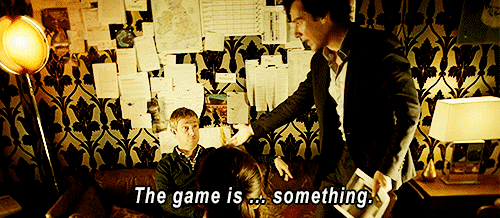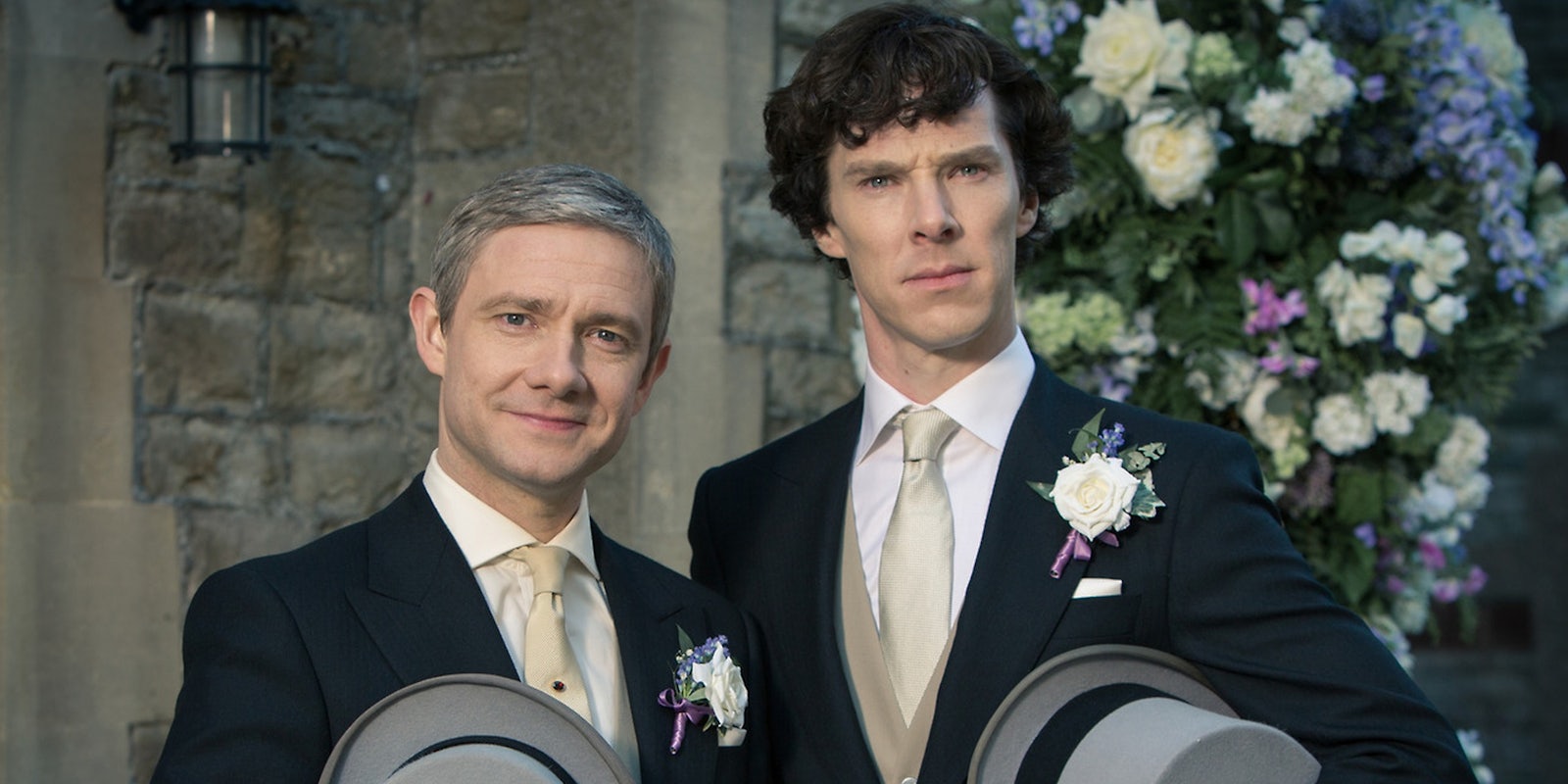Remember last week, when we said that Sherlock’s strength was its ability abandon the crime TV formula and consistently turn out a series of feature-length thrillers? Well, forget that whole “crime TV” bit. And maybe the “thriller” thing as well.
The latest episode, “The Sign of Three,” resembled nothing more than a Richard Curtis comedy: slapstick humor, extreme social awkwardness, a wedding, and lots of public British drunkenness. Any crime-solving was pretty much an afterthought.
Following last week’s season premiere, some TV reviewers were already beginning to notice a slight divide in audience reactions. “The Empty Hearse” received a very positive reception overall, but some still felt that the abundance of fandom-friendly jokes and references ran the risk of alienating casual viewers. The Guardian was even prompted to run an article that asked whether Doctor Who and Sherlock were concentrating on fanservice to the detriment of non-fandom audiences.
has sherlock bandersnatch solved any crimes yet or is he just standing there fluffing his fucking cheekbones #lawn #off #get
— Warren Ellis (@warrenellis) January 5, 2014
Since the season premiere boasted upwards of nine million live viewers, it didn’t seem likely that Sherlock was snobbishly catering to “a narrow band of obsessives.” But with this episode? Maybe The Guardian had a point. Reviews are already sure to be mixed thanks to the lack of a central crime storyline, but the biggest divide may not be between casual viewers and “obsessives,” but between people who are or are not receptive to fanfic tropes.
If you enjoyed “The Sign of Three,” you were basically enjoying what fandom refers to as “crackfic.” Instead of concentrating on a balance between the John/Sherlock relationship and a crime storyline, this episode was a character-based comedy, which lacked a coherent plot structure and was packed with bizarre and often unrealistic throwaway scenes. To a fanfic reader, it was gold, but to a crime drama fan who just wanted to see Benedict Cumberbatch swish around in a posh coat and fight crime, it may well have been a baffling disappointment.

GIF via thedoctorsjawn/Tumblr
The story, such as it was, took the form of a series of flashbacks into John and Sherlock’s friendship, told while Sherlock was giving what may well be the most agonisingly embarrassing Best Man speech in TV wedding history. After last week’s surprisingly character-driven episode, it was simple enough to assume that “The Sign Of Three” would have a heavier crime plot, but Sherlock surprised us again by airing one of the weirdest episodes yet.
Except unlike the first season’s widely disliked wildcard episode, “The Blind Banker,” the fan reception to “The Sign of Three” has mostly been very positive. Crackfic it may be, but most fandom viewers are here for the characters, not the crime drama. They want to see more everyday scenes where John and Sherlock interact, along with small, vignette-style stories about their day-to-day life. In a series that only provides three scant episodes every two years, this kind of episode provides a far wider range of canon material to work with during the lengthy hiatus. And as Sherlock’s writers have pointed out in interviews, their intention was not to write a detective show, but “a show about a detective.”
We’ve written before about how Sherlock is, at heart, a modern-day alternate universe (AU) fanfic based on the Holmes stories, but with this episode it evolved from being fanfic in the technical sense (i.e. fiction written by fans, about pre-existing characters), to embracing the culture of fannish storytelling tropes. Sherlock acting as John and Mary’s wedding planner, played for laughs? Sherlock, helping a bridesmaid find a perfect boyfriend? Mycroft in leggings, inspecting his belly fat? This is a very different tone from Sherlock’s usual brand of melodrama — but it’s a flavor of weirdness that is all too familiar to anyone who reads fanfic about scenarios that the canon writers are too conservative to show onscreen. Also, crucially, this episode was a goldmine of GIF-able scenes, from Sherlock pirouetting in a tailcoat to a shirtless cameo from the actor who played Dean Thomas in the Harry Potter movies.
Luckily for fandom, Sherlock’s writers are confident enough in their viewer ratings that they can (and will) do whatever they want. This week, that apparently meant airing something that had all the hallmarks of a filler episode from a full-season TV series, rather than a trilogy of 90-minute dramas. In another show, this might even have signalled that they were in the process of jumping the shark, but with Sherlock it’s difficult to say.
Fans who were less than impressed by Sherlock’s comedy wedding antics can rest easy in the knowledge that the third and final episode of the season looks like it’s going to be pretty dark: blackmail, the worrying possibility that Mary Watson might die like in the original Holmes stories, and a villain played by none other than Lars Mikkelsen, the brother of Hannibal Lecter himself. So despite the looming inevitability of another long hiatus ahead, Sherlock fans are still waiting for “His Last Vow” with bated breath.
Photo via cumberbatchweb/Tumblr
